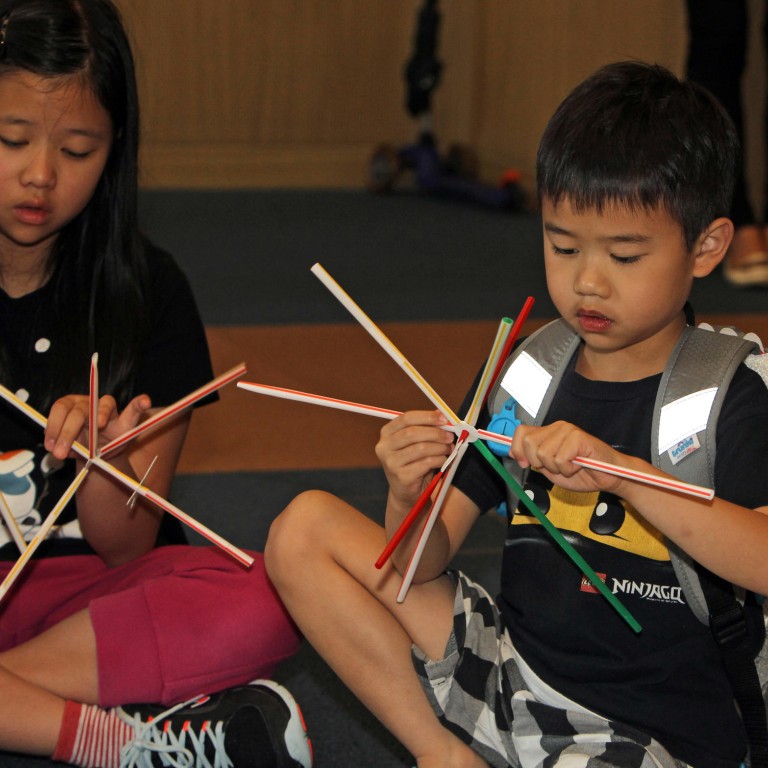
Hong Kong hackerspace movement lets children learn by creating
Hackerspace concept expands via events such as MakerCamp - a break from traditional, heavily scripted Hong Kong education
The children are busy playing around with batteries, LEDs and electricity-conducting tape while Brian Smith explains how circuits work. No one is looking at Smith, however, but that's the point. The youngsters, mostly around age 11, are taking part in a MakerCamp workshop, part of a movement to show children how to learn by creating.
Organisers say they started the series of summer workshops for youngsters because they wanted children to learn differently. For example, instead of structured lessons where teachers explain how electricity works, the children try to build a simple circuit using wire and batteries to turn on an LED light. Or they might create something using a 3D printer or print a T-shirt with a silk screen.
Smith, a technology coach at Hong Kong International School and a volunteer at the event, says it's about letting people learn by doing.
"A lot of times we teach a concept [in class] and ask students to go do it; I think we should flip that," he says.
"It's about putting agency back to the learner, back to the doer; instead of just going out and buying new things when something goes wrong, you try and figure things out."

Many children enter school with that mindset.
"They have a lot of questions", Smith says. "But this gets trained and educated out of them as they go through [school]."
Brian Tang Wha-li, a lawyer and co-founder of MakerCamp HK, hopes they can change the way parents here think about educating their children. The father of three says he started the workshop series last year because he realised there was nothing like that for his children.
"In Hong Kong, everything is overly prescribed ... for the kids, both in school and outside," Tang says. "With making, it's about introducing tools [including new technologies and design thinking] and then taking a step back to see what they do."
Practising what he preaches, Tang encourages his children to learn how to make their own games instead of playing games to keep them occupied. At Cyberport, his nine-year-old son Zac helps him show other children how to make unusual computer interfaces by connecting bananas to a circuit and then to a laptop.
Since its launch last year, MakerCamp HK events have been drawing attention in Hong Kong: Tang says local charities and educational institutions have expressed interest in working with him to develop a "young maker" curriculum.
For now, volunteers hope to maintain MakerCamp HK as a free event and may host similar activities in public libraries so more children can benefit, Tang says.
Smith says the "maker" community in Hong Kong is starting to grow - and the trend is related to the spread of the "hackerspace" movement, where people come together to make things, from electronic gadgets and drones to cardboard sculptures.

These places are starting to catch on: Dim Sum Labs, Hong Kong's first hackerspace, which opened in Sheung Wan a few years ago, was joined MakerHive in June, followed by MakerBay in Yau Tong.
Still, there's some way to go before parents in Hong Kong stop focusing just on achievements, Tang says. "There are still too many parents here who ask: 'If they sign up for this … is there is a grade or a certificate I can get?'
"It's really about changing the parental mindset … the part that appeals to me as a parent is looking at 21st century skill sets such as critical thinking, problem solving, collaboration and resilience. To be able to innovate, kids mus be willing to try and create new things."
Eric Kan, who took his young son and daughter, says the camp makes a nice change to other summer activities.
"It's good to let them try new things," Kan says. "They've had swimming classes and more traditional summer activities, so we'll let them try something newer and more hi-tech."
While MakerCamp volunteers stress that it's not about allowing children to pick up skills that may eventually help in their careers, advertising creative director Manolis Perrakis believes it will help.

"Fifteen years from now, I would be looking for this kind of person, I would not be asking them which university they came from, I would be asking them: 'Did you go to MakerCamp when you were 12 or 13?'" says Perrakis, a co-founder of Dim Sum Labs.
Top schools are looking for similar qualities when deciding on student admissions. Since 2013, the Massachusetts Institute of Technology has been taking optional "maker portfolios" from applicants in addition to extracurricular activities such as music and art.
Events such as MakerCamp provide a kind of second education for the children, Perrakis adds, recalling how much he wanted to tinker and create as a 12-year-old. He was really interested in electronics but neither his parents nor his school really knew how to help him.
So he did it himself, getting electronics components by taking toys apart and stripping out the electronics. "But the only thing I needed was someone to show me the sources."
Rebecca Lucas-Timpany brought her two children to the MakerCamp and they are already tinkering with a microchip and learning how to write computer code, she says.
Architect and Dim Sum Labs director Michelle Poon led a popular booth showing children how to screen print a T-shirt.
Describing makers as a "21st-century arts and crafts movement", she says children are more satisfied when creating something themselves.
While children may get a quick thrill when they buy a T-shirt that they like, "they're so much happier when they make it and they're going to keep the shirt for much longer."
